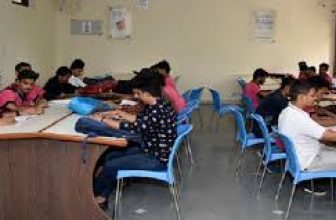
Daily Current Affairs 6 January 2021 are very important for Competitive Exams like SSC, Railway, RRB, Banking, IBPS, PSC, UPSC etc. We gkseries team compose these Daily Current Affairs from Newspapers like The Hindu and other competitive magazines.
Companions of the sacred Sabari on tri-State border
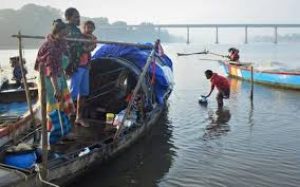
For nearly two decades, the sacred river Sabari and a group of four migrant fisherfolk families have remained steadfast companions near Chintoor village along the tri-State border of Andhra Pradesh, Odisha and Chattisgarh in East Godavari Agency.
The Sabari River is one of the main tributaries of Godavari.
It originates from the western slopes of Eastern Ghats in Odisha state from Sinkaram hill ranges. It forms common boundary between Chhattisgarh and Odisha states and later enters into Andhra Pradesh to merge with River Godavari.
It is also known as Kolab river in Odisha. Upper Kolab project, located in Odisha across the Sabari is a major dam project supplying water for irrigation and Hydro power generation.
Sileru River (known as Machkund in its upper reaches) is the major tributary of Sabari which joins Sabari river at tri-junction boundary point of Andhra Pradesh, Chhattisgarh and Odisha. Sileru river has huge potential of hydro electricity generation.
Political leaders arrested at Ramateertham temple
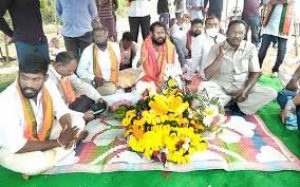
Andhra Pradesh BJP executive member Nadukuditi Eswara Rao and 12 others who have been protesting in Ramateertham for the last six days demanding the immediate arrest of the culprits involved in the vandalism of Lord Rama’s idol at Sri Kodandapani temple were arrested.
The idol of Lord Rama atop the historic Ramateertham temple, located 12 km from Vizianagaram, was vandalised on December 29. A part of the idol was identified in a small pond on December 31.
Ramateertham is a village panchayat in Nellimarla mandal of Vizianagaram district in Andhra Pradesh in India. It is about 12 km from Vizianagaram city.
Ramateertham is one of the places made sacred by a traditional connection with Lord Sree Rama.
The famous ancient temple of Ramachandra Swamy can be found here. The beautiful idols of Lord Ramachandra Swamy, Sita and Lakshmana in Silver kavachas can be seen at this temple.
Conservation plan on table to save bat species in Kolar caves

The Kolar Leaf-Nosed Bat was found in only two caves in the village of Hanumanahalli in Kolar district of Karnataka. For reasons that are still unknown, the bat became locally extinct in one of the two caves. And now, the Karnataka Forest Department, along with the Bat Conservation India Trust (BCIT), is on a war footing to save the remaining bats, which are endemic to the area, from extinction.
Common Name: Kolar leaf-nosed bat or leafletted leaf-nosed bat.
Scientific Name: Hipposideros hypophyllus.
Family: It is a species of bat in the family Hipposideridae.
Habitat: Its natural habitats are subtropical or tropical dry forests and caves.
Distribution: It is endemic to India. It is found in only one cave in Hanumanahalli village in the Kolar district of Karnataka, and its population is less than 200 individuals.
Conservation: It is currently evaluated as critically endangered by the IUCN.
RBI comes up with Digital Payments Index

The Reserve Bank of India (RBI) has constructed a composite Digital Payments Index (DPI) with March 2018 as the base period to capture the extent of digitisation of payments across the country.
The RBI-DPI has been constructed with March 2018 as the base period.
The DPI for March 2019 and March 2020 work out to 153.47 and 207.84 respectively, indicating appreciable growth.
The RBI-DPI comprises five broad parameters, including Payment Enablers, Payment Infrastructure – Demand-side factors and Supply-side factors, Payment Performance and Consumer Centricity,” the banking regulator said.
RBI-DPI shall be published on RBI’s website on a semi-annual basis from March 2021 onwards with a lag of 4 months.
The digital payments ecosystem is currently dominated by large technology players including Paytm, PhonePe, Google Pay, and recently launched WhatsApp Payments.
India’s UPI payments had shot up 82 per cent in the current fiscal year’s Q2 along with a 99 per cent jump in value from the year-ago period, according to the Worldline India Digital Payments report.
Community fishing banned at Assam Ramsar site
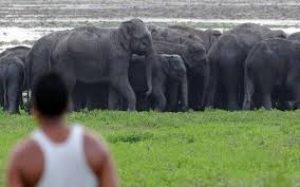
The Kamrup (Metropolitan) district administration has prohibited community fishing at Deepor Beel, a wetland on the south-western edge of Guwahati and Assam’s only Ramsar site.
The prohibition order under Section 144 of the Cr.PC underlines the possibility of community fishing on January 3 and will remain beyond the mid-January Magh or Bhogali Bihu that is preceded by mass fishing in many parts of the State.
The order was necessary to prevent fishing, excavation and construction in and around the wetland that has been shrinking over the years.
Deepor Beel was designated a Ramsar site in 2002 for sustaining a range of aquatic life forms besides 219 species of birds.
A Ramsar site is a wetland designated to be of international importance under the Convention on Wetlands on February 2, 1971, in the Iranian city of Ramsar.
Coastal city is more prone to floods caused by tidal events or extreme rainfall
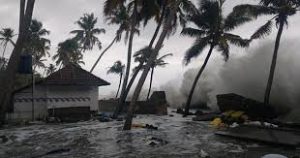
To understand if a coastal city is more prone to floods caused by tidal events or extreme rainfall, a team from the Indian Institute of Technology Bombay devised a new metric or measure called the Tide–Rainfall Flood Quotient.
Using the past rainfall data, tidal data, and topography of the region this framework can be applied to pinpoint the major factor at play.
The team selected three geographically diverse flood-prone coastal regions – Mithi Catchment in Mumbai, Maharashtra, Jagatsinghpur District in Odisha, and Greater Chennai Corporation in Tamil Nadu to test their new metric.
The new method helped classify these regions into ‘storm-tide dominated’ or ‘pluvial (rainfall) dominated’ regions.
The metric can help disaster management experts in framing better flood risk management systems directed towards long term planning.
India looks at lithium reserves in Argentina, Chile and Bolivia
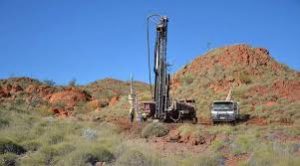
India inked a pact with an Argentine firm mid-last year to jointly prospect lithium in the South American country that has the third largest reserves of the silver-white alkali metal — a crucial building block of the lithium-ion rechargeable batteries that power electric vehicles (EVs), laptops and mobile phones.
The new company, Khanij Bidesh India Ltd was incorporated in August, 2019 by three state-owned companies, NALCO, Hindustan Copper and Mineral Exploration Ltd, with a specific mandate to acquire strategic mineral assets such as lithium and cobalt abroad
It is also learnt to be exploring options in Chile and Bolivia, two other top lithium-producing countries.
Lithium, the silver-white alkali metal is a crucial building block of the lithium-ion rechargeable batteries that power electric vehicles (EVs), laptops and mobile phones.
Currently, India is heavily dependent on import of these cells and the move to ink sourcing pacts for lithium is seen as another salvo in the front against China, a key source of both the raw material and cells.
Rajya Sabha saw the lowest number of sittings ever in 2020
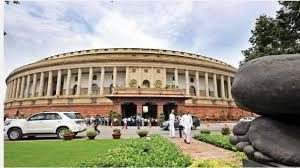
With the government refusing to call the winter session of Parliament, the Rajya Sabha sat for just 33 days in 2020, its lowest-ever tally of sittings in a year. There are only three other occasions when the Upper House sittings were below 50 days in a year.
The Budget and the monsoon sessions had to be cut short due to COVID-19.
There are only three other occasions when the Rajya Sabha met for fewer than 50 sittings in a year — 48 in 1999 and 46 each in 2004 and 2008.
The last time the winter session was cancelled was 36 years ago in 1984. In overall parliamentary history, there have been only two other instances in 1979 and 1975 when the winter session was cancelled.
As per an analysis by the Rajya Sabha Secretariat, the limited number of sittings did not hurt the productivity. During the year 2020, the annual productivity has been 82.7%, the highest annual productivity during the last 11 years.
A total of 39 Bills have been passed by the House during 2020, including 12 during the Budget session and 27 during the monsoon session.
40th Indian scientific expedition to Antarctica

The 40th Indian Scientific Expedition to Antarctica (ISEA) departed for the South Pole from Mormugao Port, Goa with 43 members on board, January 5, 2021.
This Indian expedition marks four decades of country’s scientific endeavour to the southern white continent.
The 40th expedition journey will be flagged off from Goa on January 5, 2021, with 43 members onboard.
The chartered ice-class vessel MV Vasiliy Golovnin will make this journey and will reach Antarctica in 30 days. After leaving behind a team of 40 members, it would return to India in April 2021. On return, it will also bring back the winter team of the preceding trip.
DoE circular asks teachers to check weight of school bags
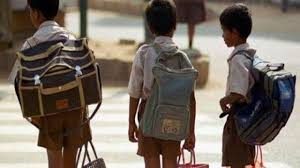
The Directorate of Education has issued a circular asking schools to follow the new ‘School Bag Policy, 2020’ released by the National Council of Educational Research and Training (NCERT).
According to the circular, schoolteachers should inform the students in advance about the books and notebooks to be brought to school on a particular day and frequently check their bags to ensure that they are not carrying unnecessary material.
The weight of the school bags, as per the policy, should be 1.6 to 2.2 kg for students of Classes I and II, 1.7 to 2.5 kg for Classes III, IV and V, 2 to 3 kg for Classes VI and VII, 2.5 to 4 kg for Class VIII, 2.5 to 4.5 kg for Classes IX and X and 3.5 to 5 kg for Classes XI and XII.
The teachers should take the responsibility of checking the weight of school bags of the students every three months on a day selected for the whole class and any information about heavy bags should be communicated to the parents. To reduce the weight of the school bag, the school management should provide quality potable water in sufficient quantity to all the students in the school so that they do not need to carry water bottles from their homes.





